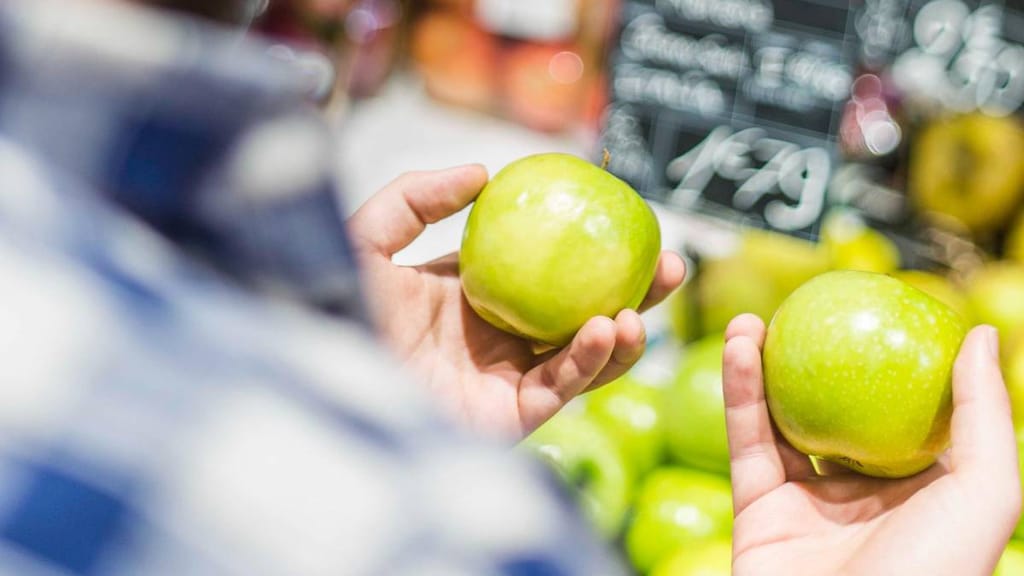Ulcerative colitis - foods to eat and avoid

Food choices may feel limited when first diagnosed with ulcerative colitis, a type of inflammatory bowel disease (IBD). However, there are plenty of foods that you can enjoy.
No one type of food or diet can cause, prevent or cure the symptoms of the disease, but when combined with medication may help induce remission of the disease. Knowing what foods you can eat and what to avoid can help manage the symptoms of ulcerative colitis.
Ulcerative colitis impacts the digestive system and can reduce the absorption of nutrients that your body needs from your food. A good diet and nutrition are important for managing any symptoms you may have and for overall health in general. Paying attention to what you eat, noting any trigger foods and eating a well-balanced diet consisting of nutrient rich foods from all the main food groups can help prevent any nutritional deficiencies.
Develop an individualized diet plan with your healthcare provider or dietitian to find one that works best for you during relapses and keeps symptoms at bay.
What is ulcerative colitis?
Ulcerative colitis is an IBD that causes the lining of the large intestine to become inflamed and small ulcers to develop on the colon's lining. It is a chronic, long-term condition that can have weeks or months with mild or no symptoms followed by flare ups. During a flare up, or relapse, the symptoms of ulcerative colitis return or ‘flare up’. The severity of a flare up can vary.
Common symptoms are diarrhea, urgency to have a bowel movement, abdominal pain, nausea, vomiting, blood in the stool, constipation, loss of appetite, fatigue and weight loss. These can have a negative impact on your nutrition and health.
What foods should I avoid if I have ulcerative colitis?
While no single diet has been proven to treat the intestinal inflammation that causes ulcerative colitis, avoiding some foods may help alleviate symptoms during a flare-up. Trigger foods are not the same for everyone, so it is important to track what you eat and identify your own troublesome foods.
Avoid these foods during an ulcerative colitis flare-up, as they can be potential trigger foods:
- Foods high in insoluble fiber: whole grain foods (like some breads, cereals, pastas, brown rice and popcorn), fruits with skin and seeds, some raw green vegetables, broccoli, cabbage, brussel sprouts, nuts, seeds, beans, lentils and peas
- Dairy products: milk, cream cheese and soft cheeses
- Non-absorbable sugars: sugar alcohols such as sorbitol and mannitol, which are found in sugar-free foods like gum, candy and ice cream
- High-sugar foods: pastries, candy, chocolate and juices
- High-fat foods: butter, margarine and cream, as well as greasy foods such as pizza and fried foods
- Alcoholic and caffeinated beverages: beer, wine, liquor, soda and coffee. Elimination of alcohol may not be required, but it should be consumed in moderation.
- Spicy foods
What foods should I eat if I have ulcerative colitis?
Many people with ulcerative colitis can eat a normal diet, but during flare-ups your diet may need to be altered to help reduce your symptoms.
Eating during a flare up
When you are experiencing a flare-up, eating a temporary diet of low-residue or low-fibre foods may reduce the amount and frequency of the stools you pass and allow your colon to heal.
Foods to eat during a flare-up include:
- Low-fiber fruits: bananas, cantaloupe, honeydew melon. Cooked, pureed, canned or peeled fruits. Avoid skins and seeds.
- Lean protein sources: fish, lean cuts of pork, white meat such as chicken, soy, eggs, firm tofu and smooth nut butters
- Refined grains: sourdough, potato or gluten-free bread, white pasta, white rice and oatmeal
- Seedless, skinless vegetables: fully cooked, peeled vegetables such as asparagus tips, cucumbers, potatoes and squash
- Oral nutritional supplements or homemade protein shakes
Eating when in remission
When symptoms have lessened or subsided, many people with ulcerative colitis can resume a more normal, well-balanced diet and reintroduce foods slowly.
Slowly reintroduce:
- Fiber-rich foods: oat bran, beans, barley, nuts, and whole grains.. Fibre-rich foods, however, may not be appropriate if you have an ostomy, intestinal narrowing or strictures, or have had recent surgery
- Protein: lean meats, fish, eggs and firm tofu
- Fruits and vegetables: eat a variety of colorful fruit and vegetables. Remove the peel and seeds if they bother you
- Calcium-rich foods: collard greens, yogurt, kefir and milk. If you are lactose intolerant, choose lactose-free dairy products or use a lactase digestive enzyme
- Food with probiotics: yogurt, kimchi, miso, sauerkraut and tempeh
- Vegetable stock: vegetable stocks are a good source of added nutrients. Use in soup, add to pasta and rice, and cook vegetables in it
Tips for managing ulcerative colitis symptoms
- Consult your healthcare provider or dietitian before making any changes to your diet
- Eat a well-balanced nutrient rich diet
- Eat more frequently. Eat five to six smaller meals over the course of a day
- Stay hydrated by drinking water and fluids with salt - like broth, tomato juice or rehydration solutions
- Drink slowly and avoid using a straw because these may cause gas due to taking in air
- Use a food diary to record the foods you eat and how these impact your symptoms
- Avoid your specific trigger foods
- Use simple cooking methods - boil, steam, grill, poach, broil or saute
Article references
- Crohns and Colitis Foundation of America. Diet and nutrition. What should I eat? Available at: https://www.crohnscolitisfoundation.org/diet-and-nutrition/what-should-i-eat. [Accessed November 2, 2020].
- Crohns and Colitis Foundation of America. What is ulcerative colitis?. Signs and symptoms of ulcerative colitis. Available at: https://www.crohnscolitisfoundation.org/what-is-ulcerative-colitis/symptoms. [Accessed November 2, 2020].
- National Health Service UK (NHS). Ulcerative colitis. Living with ulcerative colitis. January 23, 2019. Available at: https://www.nhs.uk/conditions/ulcerative-colitis/living-with/ [Accessed November 2, 2020].
- Crohns and Colitis Foundation of America. Managing flares and other IBD symptoms. January, 2015. Available at: https://www.crohnscolitisfoundation.org/sites/default/files/legacy/assets/pdfs/Managing-flares.pdf. [Accessed November 2, 2020].
- Crohns and Colitis Foundation of America. Diet, nutrition and inflammatory bowel diseases. November, 2013. Available at: https://www.crohnscolitisfoundation.org/sites/default/files/legacy/assets/pdfs/diet-nutrition-2013.pdf. [Accessed November 2, 2020].
- Crohns and Colitis Foundation of America. Living with ulcerative colitis. December, 2018. Available at: https://www.crohnscolitisfoundation.org/sites/default/files/legacy/assets/pdfs/living-with-ulcerative.pdf. [Accessed November 2, 2020].
- Brown AC, Rampertab SD, Mullin GE. Existing dietary guidelines for Crohn's disease and ulcerative colitis. Expert Rev Gastroenterol Hepatol. 2011;5(3):411-425. doi:10.1586/egh.11.29.
- Richman E, Rhodes JM. Review article: evidence-based dietary advice for patients with inflammatory bowel disease. Aliment Pharmacol Ther. 2013;38(10):1156-1171. doi:10.1111/apt.12500.
- Durchschein F, Petritsch W, Hammer HF. Diet therapy for inflammatory bowel diseases: The established and the new. World J Gastroenterol. 2016;22(7):2179-2194. doi:10.3748/wjg.v22.i7.2179.
- Wędrychowicz A, Zając A, Tomasik P. Advances in nutritional therapy in inflammatory bowel diseases: Review. World J Gastroenterol. 2016;22(3):1045-1066. doi:10.3748/wjg.v22.i3.1045.



